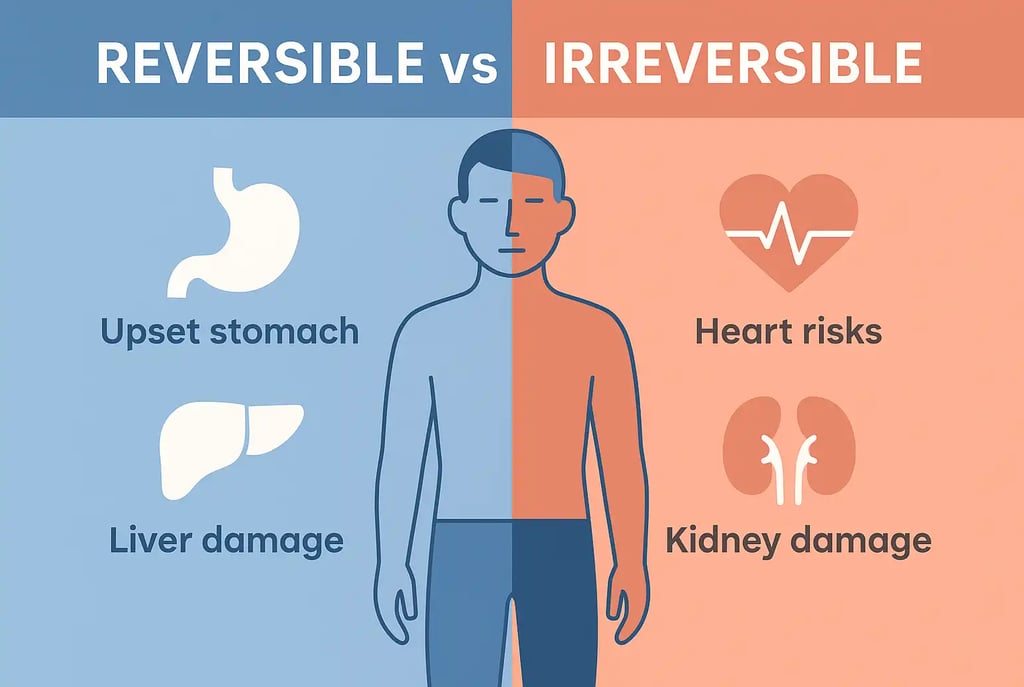Are Ibuprofen Side Effects Reversible? What May Go Away and What May Be Permanent
Learn which ibuprofen side effects are reversible and which may cause lasting damage to your stomach, liver, kidneys, or heart from long-term use.


Are Ibuprofen Side Effects Reversible? What May Go Away and What May Be Permanent
Common Ibuprofen Side Effects That Are Typically Reversible
Upset stomach
This is one of the most common ibuprofen side effects and usually resolves once you stop taking the medication.Mild dizziness or headache
Often short-lived and goes away as the drug leaves your system.Heartburn or indigestion
Usually temporary and can be managed by taking ibuprofen with food, or switching to another pain reliever.Mild fluid retention or bloating
Can resolve after discontinuing use, especially in short-term users.Ringing in the ears (tinnitus)
May occur at high doses, but in many cases, it disappears once ibuprofen is stopped.
Ibuprofen Side Effects That May Be Irreversible or Require Medical Treatment
Kidney damage
Chronic use or high doses of Ibuprofen can impair kidney function, especially in older adults or those with pre-existing kidney issues. Damage may end up being permanent if not caught early.Liver damage
Although rare, prolonged use of Ibuprofen can lead to liver enzyme elevations or, in severe cases, permanent liver injury.Gastrointestinal bleeding or ulcers
These can occur with long-term use or high-doses of Ibuprofen. In some cases, the damage may be long-lasting or require surgery.Increased blood pressure or heart risks
Taking Ibuprofen regularly for weeks or months at a time — especially in high doses — may raise blood pressure and increase the risk of serious cardiovascular issues like heart attack or stroke, particularly in people with preexisting heart conditions.Allergic reactions or skin conditions
Severe skin reactions are rare but can cause lasting effects if not treated promptly.
How to Minimize the Risk of Permanent Side Effects
Use the lowest effective dose for the shortest time needed.
Avoid combining ibuprofen with alcohol or other NSAIDs.
If you have kidney, liver, or heart conditions, consult a healthcare provider first.
Monitor for unusual symptoms — especially stomach pain, dark urine, yellowing of the skin, or swelling.
Stay hydrated while using ibuprofen, especially during illness or exercise.
FAQ:
Can kidney damage from Ibuprofen be reversed?
Sometimes — if caught early and ibuprofen is stopped, kidney function may recover. But long-term use can cause irreversible harm.
What about liver damage?
Mild liver enzyme elevations may return to normal. Severe cases of liver injury, however, may be permanent.
Does stomach damage heal after stopping ibuprofen?
Yes, in many cases. Minor stomach lining irritation can heal. But ulcers or GI bleeding may cause lasting issues if left untreated.
If I stop taking Ibuprofen, will the side effects go away?
It depends on the side effect. Most mild reactions resolve after stopping. Serious damage may be long-term or permanent.
Is long-term Ibuprofen use ever safe?
Only under medical supervision. Long-term use increases the risk of numerous irreversible side effects.
Disclaimer
This page summarizes information from trusted medical sources and is provided for general knowledge only. lt is not medical advice; Always consult your doctor or pharmacist for personal medical guidance (For a more comprehensive explanation please see the full disclaimer).
Resources
The information above has been compiled from multiple reputable medical sources, including:


